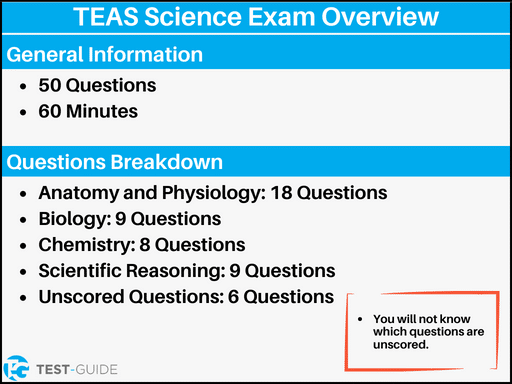All TEAS Science Practice Tests
Use our TEAS science practice test to study the different concepts and topics you will be tested on.
All of our TEAS science questions include detailed answer explanations and require no registration. Start your practice below!
You can prepare for other sections of the exam by visiting our TEAS 7 exam home.
TEAS Science Overview
TEAS science is one of the more challenging sections of the exam. It includes:
- 50 Questions
- 60 Minutes
The 50 questions are broken into 5 “groups” of questions. Those 5 groups are:
- Anatomy and Physiology: 18 Questions
- Biology: 9 Questions
- Chemistry: 8 Questions
- Scientific Reasoning: 9 Questions
- Unscored Questions: 6 Questions
You will not know which questions are unscored, so it is important to try your best on all questions. If you want to keep pace, you will want to spend less than 72 seconds on each question.
If you are feeling confident after using our TEAS science questions, head over to our TEAS 7 practice hub for more exams in other subjects.
Frequently Asked Questions
How many questions are on TEAS science?
There will be 50 total questions on the science portion of the TEAS exam. However, only 44 questions will be scored. You will not know which questions are the unscored questions.
How much time will I have to take the TEAS science exam?
You will have 60 minutes to complete the science section. This breaks down to 72 seconds per question.
Is there a passing score for TEAS science?
Every school or program will have their own passing scores. When you take the exam, you will be given a composite score that takes all sections into account.
Most schools typically require a minimum score of 70%.


